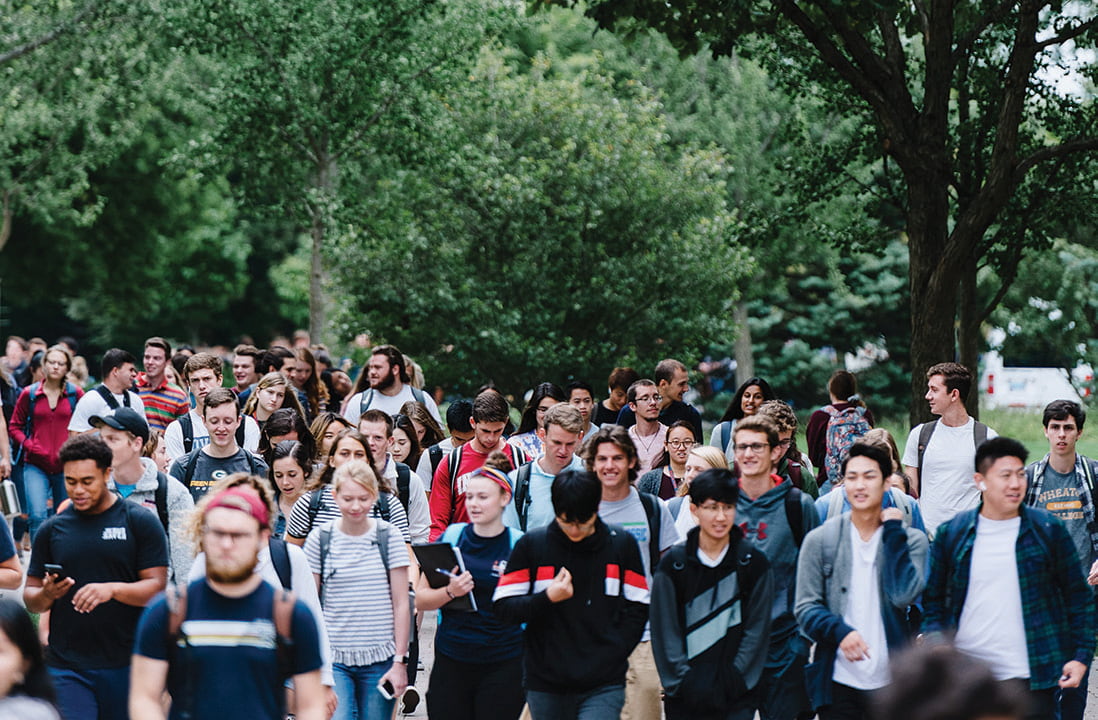Kids These Days
Insights on College Freshmen, Emerging Adulthood, and Gen-Z
Words: Emily Bratcher
Photos: Tony Hughes
Leaving home to go to college has always been a big transition.
Students exit the security of their families and high school friends and enter a space where almost everything is new. They become responsible for managing their course schedules, doing their laundry, and waking up on time for class.
On top of these normal challenges, Gen-Z freshmen also have some additional hurdles—starting school during a pandemic, contending with social and political upheaval at home and abroad, and rising levels of stress and anxiety, all of which make it an interesting time to be a kid these days.
Here are some insights about first-year students from Wheaton College faculty, staff, and alumni.
KIDS THESE DAYS ARE CONTENDING WITH EMERGING ADULTHOOD
“In the past five years, there has been a significant and rapid change in the maturity, resilience, and mental and emotional health of today’s youth and young adults,” said Dr. Rob Ribbe ’87, M.A. ’90, executive director of HoneyRock Center for Leadership Development.
Although 18-year-olds are legally adults, in reality, many are what developmental psychologists, starting with Clark University psychologist Jeffrey Arnett, now term “emerging adults.” A timeframe between high school and the late 20s, “emerging adulthood” is characterized by identity exploration, instability, self-focus, and having an array of possibilities.
So in addition to trying to manage the practicalities of college life, students are also trying to figure out who they are and their place in the world, maybe for the first time.
“For most first-year students, the focus, the preoccupation, the radar screen of their lives is very up close,” said Dr. Tim Clydesdale ’87, Vice Provost and Dean of Graduate Studies at The College of New Jersey.
They feel tremendous instability while also seeing an almost debilitating number of possibilities for their lives, he added. One of the reasons is that there is no longer one narrative for adulthood.
“Our understanding of adulthood has changed culturally,” Clydesdale said.
For instance, in the 1960 Census, 77% of women and 65% of men aged 30 reached all of the traditional markers of adulthood—leaving home, finishing school, reaching financial independence, getting married, and having a child. In the 2020 Census, only about one-third had achieved the same. More and more people are picking and choosing the benchmarks they want for their own lives.
“Too many choices can become very paralyzing for people, so they just end up avoiding the choice—and that’s where we are culturally,” Clydesdale said. “There are so many choices and so many directions that one’s life can take. There’s not a commonly accepted script for how it’s supposed to go, and consequently it’s a difficult time to be a young adult, trying to navigate all that.”
KIDS THESE DAYS ARE WRESTLING WITH SOCIAL MEDIA
Life on college campuses looks a lot different now than it did before 2007.
The introduction of the iPhone made it easier than ever to communicate, shop, manage finances, and experience entertainment, but 15 years later, there are also pastimes like binge-watching, doomscrolling, texting, sharing YouTube videos, and creating social media content, said Dr. Read Mercer Schuchardt, Associate Professor of Communication at Wheaton, who studies the cultural effects of social media.
It’s notable that “when we get a break in class, the first thing that almost all of the students do is pull out their phone and engage through the device,” said Professor of Sociology Dr. Brian Miller ’04, who studies emerging adults and social media.
But these students aren’t the first Christians to embrace new media.
Miller says American evangelicals in the twentieth century were quick to take up new technology forms and adapt them to Christian uses. Miller points to the National Association for Evangelicals and its concern that evangelicals had a radio presence. As other media forms were introduced—television, Internet, and social media—American evangelicals have adopted and used them.
“My sense as a sociologist is that we’ve often innovated and adapted [to new technology] and then asked questions later,” he said.
Right now, for instance, Miller said more Christians might consider asking some questions, such as, “Is what we’re doing on social media as Christians good or useful?”
Schuchardt said two of his students are already doing that. Although both students have garnered 2 million views on their TikTok pages, they are taking a break to ask themselves that question.
Miller is encouraged about ways Wheaton students, staff, and faculty might be able to address some of these questions related to using social media responsibly. How could we build some best practices, consider the worth of social media fasts, or figure out how to gauge social media addiction?
“Wheaton has lots of resources, lots of people who are thinking about this, lots of ways to engage with it—and it’s an opportunity, I hope, that we can all participate in,” Miller said.
KIDS THESE DAYS ARE EXPLORING VOCATION
Whether students come to college confident of their future career or with only an abstract concept of it, they are almost certain to do some exploring as freshmen.
“During the first several months of the first semester, they start wrestling with these big questions like ‘Who am I?’ and ‘What does that mean for what God wants for me?’” said Rachael Botting ’14, M.A. ’15, adjunct faculty for outdoor adventure leadership.
These big inquiries call into question assumptions around career, she said.
“Perspectives of work are often based on what students know from their parents’ careers, mentors’ careers, or careers they’ve seen in action,” said Olivia Zimmermann Lorimer ’11, associate director for career education at the Center for Vocation and Career (CVC).
A fall 2021 CVC survey bears this out. In the campus survey, first-year students indicated the most interest in jobs like K–12 teacher and healthcare worker. Fourth-year students graduating in May 2022 responded differently. Their top job interests included financial analyst, business analyst, data science analyst, educator, and media communications manager.
As students move through their courses of study and CVC programming, they’re exposed to a wider range of job possibilities.
“The more exploration students are able to do, the more likely they are to discover industries and job functions that are genuinely interesting to them, rather than defaulting to the jobs they have seen firsthand,” Lorimer said.
During the Wheaton Passage orientation, leaders help students frame their college experience as their vocation. This idea comes as a moment of relief for many students who experience anxiety or pressure from parents about the future, Botting said.
“We want them to value the space and time to explore calling and explore vocation,” said Botting, who is involved with Passage.
Botting added, “The liberal arts at Wheaton College are designed to give you a strong foundation that is applicable really in any field. There’s freedom to try all these things and then narrow your focus later on.”
KIDS THESE DAYS ARE CONCERNED ABOUT JUSTICE
“Students are coming in with a lot of questions and a lot of convictions, especially on the issues that require the compassion of Christ,” says Ray Chang ’06, ministry associate for discipleship in the Chaplain’s Office.
Chang said many students—after years of seeing failures in Christian leadership, hypocrisy surfacing in significant churches and organizations, and instances of injustice around the country—come to college asking if what they were taught to believe is consistent with what the Bible is saying and who Jesus says he is.
They’re also wondering how they can live a more faithful and authentic Christian life. To that end, Chang said that many students come to college “with a deeper desire to address the issues they see consistently emerging across the country and the world and to bring healing to areas of deepest pain and to pursue justice where there is injustice.”
As they ask these questions in one-on-ones with Chang or in one of Wheaton’s small groups, many students are also getting involved with campus organizations in the Office of Multicultural Development, the racial reconcilation group Solidarity Cabinet, or the student chapter of the Asian American Christian Collaborative.
“When [these organizations] have conversations on campus, the rooms are packed,” Chang said. “They’re having conversations around issues that people want to learn about and apply their faith to.”
As students ask these questions, Chang said they are looking for models of Christian leadership that can help them navigate divided times without compromising on the truth.
KIDS THESE DAYS ARE RELEARNING THE IMPORTANCE OF SPIRITUAL DISCIPLINES
When first-year students come to college, the spiritual structure of their lives is disrupted. Often, they leave behind family and former mentors who’ve poured into their lives, as well as the church and youth group meetings that have given their lives a spiritual scaffolding.
As students are adjusting to a new schedule, it’s up to them to build Scripture reading, prayer, and other Christian practices into their calendar. But sometimes the spiritual disciplines don’t make it back into their routines.
Some students seem to think—consciously or unconsciously—that they can focus on the things that seem important to them now and then flip a switch and become the sort of man or woman of God they’d like to be, said Dr. David Setran ’92, M.A. ’94, the Price-LeBar Chair of Christian Formation & Ministry. It’s not that they’re discarding all of their spiritual disciplines, but they might set aside a few for a time.
But at Wheaton, Setran said, they’re reminded of the importance of seeing their next four years through the lens of Galatians 6.
“It’s this sense that things I’m doing now, the practices I’m engaging in, the habits I’m forming are shaping me in very significant ways,” he said about the chapter, which discusses the theme of sowing and reaping.
Phones and social media have made it more difficult than ever to engage in practices such as solitude and prayer, and the pandemic turned church into a virtual event. Plus, in an age of immediate gratification, the biblical idea of patience, the daily practice of “sowing to the Spirit” (Gal. 6:8) is truly countercultural.
Setran remembers encouraging one student to read the Bible daily. After three weeks of being in the Word, the student came back to him and said, “You know, I’m not really seeing a big change.” Setran replied, “So much of the Spirit’s work takes time and is happening beneath the surface. Check back with me in five years.”
“Part of the challenge is helping them to see and actually believe the sowing-and-reaping principle,” Setran said. “It’s part of the reason I think that mentors are so important because they can demonstrate that these practices and habits make a difference when you’re 30, 40, 50, and so on.”

